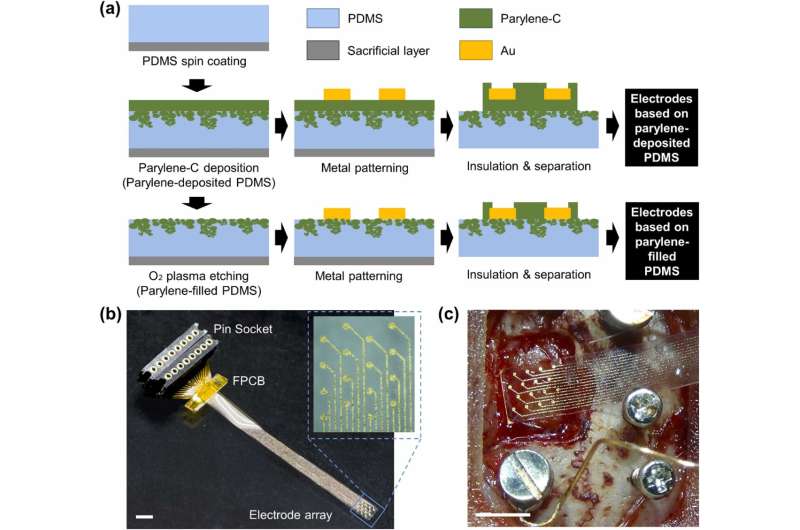This article has been reviewed according to Science X's editorial process and policies. Editors have highlighted the following attributes while ensuring the content's credibility:
fact-checked
proofread
Research team develops soft and highly durable brain electrodes that could be used in treatment

DGIST Department of Robotics and Mechatronics Engineering Professor Kim Sohee and her research team have developed a highly durable brain electrode technology that uses soft and flexible materials. The technology is expected to be used in various fields that require connections between the brain and machines, such as electrodes for treating brain diseases that involve long-term implantation.
Brain electrodes play a key role in measuring brain activity and connecting the brain to machines. However, the existing brain electrodes are either made of hard materials that have to be implanted in the brain, such as silicon, the material for semiconductor circuit chips, or made of thin plastic polymers. Such materials have limited flexibility or cannot be used for an extended period of time because of safety issues arising from the use of thin materials to ensure flexibility.
Using a rubbery, elastic material that is considerably softer than plastic polymers, Professor Kim and her team developed brain electrodes that stick extremely well to the curved and winding brain surface and that are tens of micrometers in thickness, making it significantly easier to operate.
Although these brain electrodes are composed of soft and elastic materials that have similar mechanical and physical properties as brain tissues, their stability in the body's environment has been questioned. Professor Kim and her team confirmed through an eight-month accelerated aging experiment that the electrodes can maintain their performance in measuring brain signals even after long-term use in the body.
"We have developed brain electrodes that stick quite well to the curved surface of the brain because of their soft and flexible properties while maintaining stable performance in the body's environment, where a variety of ions and water are present," said Professor Kim. "It may be used as a key technology for the brain–machine interfaces (BMIs) and brain–computer interfaces (BCIs) that do not invade brain tissues, as well as for electronic medical devices that require long-term use over several years."
The study is published in the journal Sensors and Actuators B: Chemical.
More information: Hyunmin Moon et al, Soft, conformal PDMS-based ECoG electrode array for long-term in vivo applications, Sensors and Actuators B: Chemical (2023). DOI: 10.1016/j.snb.2023.135099



















